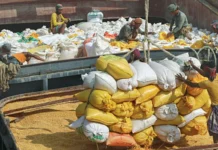Analysts say growers do not get fair price in absence of proper preservation and packaging facilities
Post-harvest losses, a lack of preservation and packaging facilities for fresh produce, and high transport costs resulting partly from extortion on highways are some of the causes of their miseries.
“Marketing is a burning issue. Farmers do not get good prices, and the government could not do much to address this,” said Anwar Faruque, additional secretary to the agriculture ministry.
He spoke at a roundtable on “poor-friendly agri-business: prospects and problems” organised by the daily Prothom Alo with support from Agri-business Trade Competitiveness Project of Katalyst at the newspaper’s office in Dhaka.
He said farmers cannot preserve their surplus produce due to a lack of proper storage facilities. “The transportation system for fresh produce remains very weak. Managing the surplus is a major problem now,” said Faruque, also the director general of the ministry’s seed wing.
Transportation costs for agricultural produce are very high, he said, adding: “A major problem here is extortion.” He said the government has developed the agro-input market quite well, but infrastructure and other arrangements were not built up for agro-product marketing.
“Now the biggest problem in the agriculture sector is ensuring fair price for farmers. So it is necessary to develop a value chain to manage their surplus,” Faruque said.
The government official also said farmers face some barriers in selling their produce directly to consumers, wholesalers’ control over the market being one of them.
Amjad Khan Chowdhury, chief executive officer of Pran-RFL Group, a food processor, said his company purchases various agri-produce such as mango, mung and pineapple through contract farming arrangements with around 78,000 farmers.
Investing in agriculture is profitable, but there are problems that should be addressed, he said.
Continued fragmentation of land is one of the major problems in the agriculture sector, he said, adding that contract farming will expand if land fragmentation is curbed.
Nirmal Chandra Bhakta, executive director of Bangladesh Bank, said agro-processing should be encouraged to help farmers get fair price. It is also important to expand e-marketing, he added.
FH Ansarey, executive director of the agribusiness division of ACI Ltd, said farm technologies should be taken to all farmers.
“The public and private sectors usually bring new technologies to big farmers. But none goes to the small and marginal ones,” he said.
Hafizur Rahman, deputy secretary to the commerce ministry, said packaging remains a major problem in agro-produce marketing. “Improvements in packaging will increase market opportunities abroad,” he said.
Sheikh Morshed Jahan, an associate professor at the Institute of Business Administration at the University of Dhaka, said farmers often incur losses due to poor knowledge of post-harvest management.
Anirban Bhowmik, head of portfolio and quality (South Asia) of Swisscontact, said a transformation is happening in agriculture. Farming is becoming semi-commercialised subsistence and thus contributing to poverty alleviation.
“Bangladeshi farmers are entrepreneurs now. So, it is important to solve their problems from business perspective. Otherwise, the problems will not go,” he said.
Firoze Shah Sikder, executive coordinator of Lal Teer Seed Ltd, said legal and institutional reforms are necessary to promote agri-business.
Fawzia Yasmeen, general manager (supply chain, business development) of Ispahani Agro Ltd, said her company is promoting the use of biopesticides to ensure production of safe food.
“Biopesticides do not do any harm to the environment,” she said, adding that cost of biopesticides is one-third of the chemical ones.
“It is totally new. So, the government should come forward to encourage farmers to use biopesticides.”
Prothom Alo’s Associate Editor Abdul Qayyum moderated the discussion.
Source: The Daily STar









